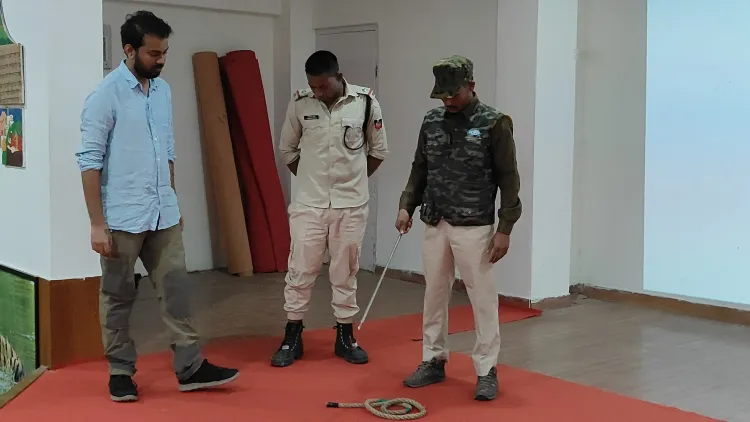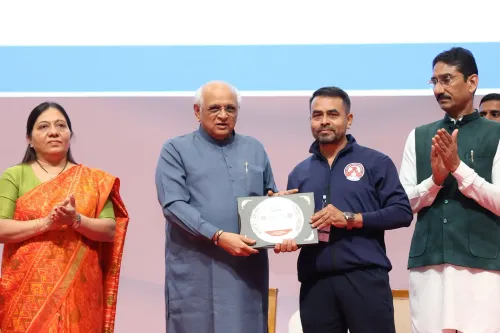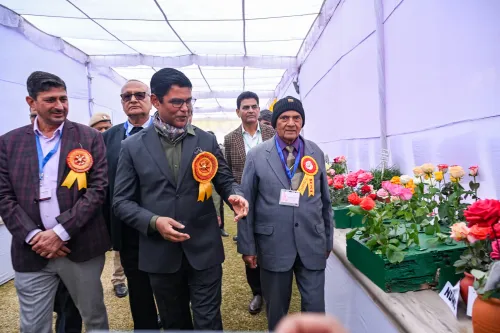Experts Highlight Snakebites as a Major Health Issue in Assam

Synopsis
Key Takeaways
- 35,000 snakebite cases occur annually in Assam.
- Over 11,000 snakebites were documented in 2024.
- A workshop on snake rescue and prevention was conducted.
- Community engagement is key to reducing human-snake conflicts.
- Training on effective first-aid for snakebites was provided.
Guwahati, Jan 28 (NationPress) Snakebites pose a significant public health issue in Assam, frequently resulting in fatalities due to delayed medical treatment and insufficient understanding of appropriate first-aid techniques, as noted by experts on Tuesday.
Dr. Surajit Giri, a specialist in snakebite management in Assam, revealed that there are approximately 35,000 snakebite incidents annually.
The Director of Assam’s Kaziranga National Park and Tiger Reserve (KNPTR), Sonali Ghosh, shared government statistics with IANS, indicating that in 2024, roughly 11,000 snakebites occurred, leading to 36 fatalities.
A two-day workshop aimed at enhancing skills in ethical snake rescue and snakebite prevention took place on January 27-28 at the Kohora Convention Centre within KNPTR.
The event attracted 43 nature enthusiasts and forest officials from eight districts: Kaziranga, Nagaon, Biswanath, Sivasagar, Golaghat, Dibrugarh, and Tinsukia.
This workshop was collaboratively organized by the Assam Forest Department, Help Earth, Madras Crocodile Bank Trust, and the Zoological Society of Assam.
Sonali Ghosh emphasized that this initiative is a vital step towards forming a knowledgeable and well-prepared network of nature advocates and frontline forest workers in Assam.
Assam's diverse ecosystem harbors a variety of snake species, including the King Cobra (Roja Feti), Monocled Cobra (ChokoriFeti), Banded Krait (Goala sap), and various pit viper species, many of which are highly venomous and contribute to the region's snakebite-related fatalities.
According to Ghosh, the state experiences a significant number of human-snake encounters, particularly during the monsoon season from June to September, when floodwaters drive snakes to human habitats.
Snakebites remain a serious public health issue, often leading to deaths due to delayed medical care and a lack of understanding of proper first-aid techniques, the senior IFS officer stated.
The main resource person for the workshop was Gnaneswar Ch, Project Leader for Snakebite Mitigation at the Madras Crocodile Bank Trust and Centre for Herpetology (MCBT).
His training sessions covered advanced techniques in safe snake handling, effective first-aid responses for snakebites, community engagement strategies to alleviate human-snake conflicts, conservation ethics, and rehabilitation methods.
Ghosh noted that participants took part in interactive sessions and practical demonstrations, obtaining hands-on training in safe snake rescue practices and effective responses to snakebite situations.
A key feature of the program was the distribution of snake rescue kits, ensuring that trained rescuers are well-prepared to perform their duties effectively.
The official remarked that the success of this workshop reinforces the shared commitment to decreasing snakebite mortality, advancing conservation efforts, and fostering coexistence between humans and snakes.
The organizers expressed optimism that such capacity-building initiatives would empower local rescuers and forest personnel to tackle snake-related challenges more proficiently. With ongoing training, awareness, and collaboration, Assam can aspire to a future where both humans and snakes coexist harmoniously, concluded the KNPTR Director.










